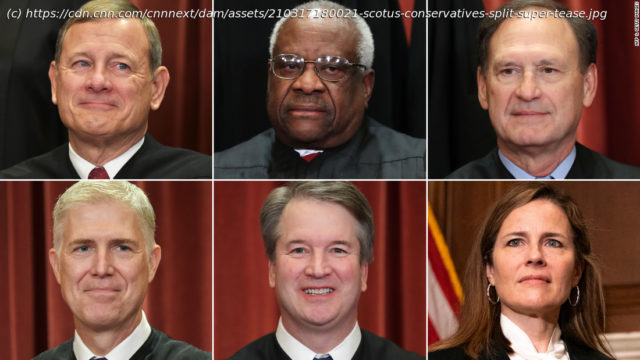All term long the Supreme Court has been the target of political players as members of Congress called for a « legislative solution, » the Biden administration launched a commission to study court reform and progressive groups claimed that court packing measures were necessary to « save » the Supreme Court.
Meanwhile, conservatives relished the possibility of a swift right turn with their new 6-3 majority after Justice Ruth Bader Ginsburg died last September and Amy Coney Barrett joined the bench the next month. By the last day of the term, the justices finally issued their own verdict. They handed out a pair of decisions with deep political undertones that will bolster the narratives put forward by the poles of both parties. The justices also foreshadowed fissures that will likely widen next year as the court hears blockbuster cases with broad social implications concerning abortion, the Second Amendment and possibly affirmative action. Which isn’t to say that the term wasn’t entirely made up of 6-3 opinions on ideological lines. Two of the most important cases of the term were 7-2 and 9-0 and there were 29 unanimous opinions. But Republicans and conservatives are finally getting the decisions they pined for as former President Donald Trump changed the face of the courts and liberals are preparing for a bloodbath. Big 6-3 decisions on politics and unions The court’s new majority was in full force on Thursday as it limited the ability for minorities to challenge state laws they believe are discriminatory under the historic Voting Rights Act in a case involving two Arizona laws that a lower court said had a disparate impact on minorities in the state. Justice Samuel Alito, echoing comments from Trump and Republican-led states claiming election fraud from last year’s presidential election, reversed and stressed for a 6-3 court what he called a state’s « entirely legitimate interest » in the prevention of fraud. He said that the Arizona laws were akin to the « usual burdens of voting » and added that while the Voting Rights Act « exemplifies our country’s commitment to democracy » the law does « not deprive the States of their authority to establish non- discriminatory voting rules. » His opinion drew a fierce dissent from Justice Elena Kagan who said the majority had « no right to remake » the law and that it « should not be diminished by this court. » Thomas A. Saenz, president of the Mexican American Legal Defense and Educational Fund said in a statement that the court’s « majority is woefully disconnected from social and historical reality, particularly when it comes to the experiences of racial minorities who continue to face daily depredations of basic rights in our country. » President Joe Biden, the Justice Department and liberal groups also criticized the ruling. In another case Thursday, Chief Justice John Roberts, writing for the same 6-3 divide, invalidated a California regulation that required charities to disclose their donors. He said the law « casts a dragnet » for sensitive information and that the state lacked a good justification. Justice Sonia Sotomayor, writing for the liberals, expressed fear that the decision will likely lead to the invalidation of other donor disclosure laws which would allow more « anonymous » money into the political system. In June, the justices also divided along ideological lines in ruling that California cannot allow unions to enter the property of agricultural businesses to address workers, unless the businesses are compensated for the visit, in a case that could have broad property rights implications.






